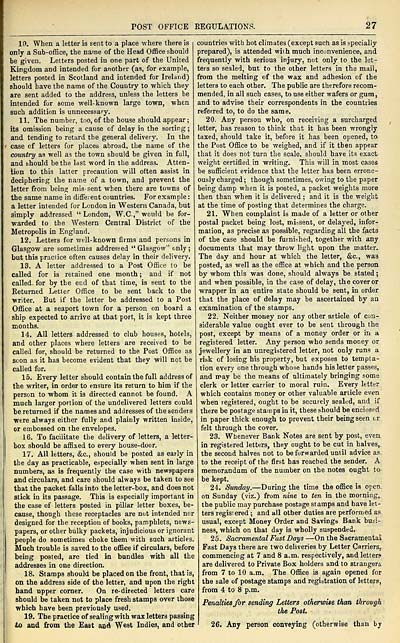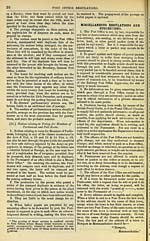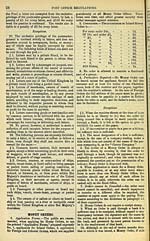Download files
Complete book:
Individual page:
Thumbnail gallery: Grid view | List view

POST OFFICE REGULATIONS.
27
10. When a letter is sent to a place where there is
only a Sub-office, the name of the Head Office should
be given. Letters posted iu one part of the United
Kingdom and intended for another (as, for example,
letters posted in Scotland and intended for Ireland)
should have the name of the Country to which they
are sent added to the address, unless the letters be
intended for some well-known large town, when
such addition is unnecessary.
11. The number, too, of the house should appear ;
its omission being a cause of delay in the sorting ;
and tending to retard the general delivery. In the
case of letters for places abroad, the name of the
country as well as the town should be given in full,
and should be the last word in the address. Atten-
tion to this latter precaution will often assist in
deciphering the name of a town, and prevent the
letter from being mis- sent when there are towns of
the same name in different countries. For example :
a letter intended for London in Western Canada, but
simply addressed " London, W.C.," would be for-
warded to the Western Central District of the
Metropolis in England.
12. Letters for w^ell-known firms and persons in
Glasgow are sometimes addressed " Glasgow" cnly ;
but this practice often causes delay in their delivery.
13. A letter addressed to a Post Office to be
called for is retained one month ; and if not
called for by the end of that time, is sent to the
Eeturned Letter Office to be sent back to the
writer. But if the letter be addressed to a Post
Office at a seaport town for a person on board a
ship expected to arrive at that port, it is kept three
months.
14. All letters addressed to club houses, hotels,
and other places where letters are received to be
called for, should be returned to the Post Office as
soon as it has become evident that they will not be
called for.
15. Every letter should contain the full address of
the writer, in order to ensure its return to him if the
person to whom it is directed cannot be found. A
much larger portion of the undelivered letters could
be returned if the names and addresses of the sendeis
were always either fully and plainly written inside,
or embossed on the envelopes.
16. To facilitate the delivery of letters, a letter-
box should be affixed to every house-door.
17. All letters, &c., should be posted as early in
the day as practicable, especially when sent in large
numbers, as is frequently the case with newspapers
and circulars, and care should always be taken to see
that the packet falls into the letter-box, and does not
stick in its passage. This is especially important in
the case of letters posted in pillar letter boxes, be-
cause, though these receptacles are not intended nor
designed for the reception of books, pamphlets, news-
papers, or other bulky packets, injudicious or ignorant
people do sometimes choke them with such articles.
Much trouble is saved to the office if circulars, before
being posted, are tied in bundles with all the
addresses in one direction.
18. Stamps should be placed on the front, that is,
' on the address side of the letter, and upon the right
hand upper comer. On re-directed letters care
should be taken not to place fresh stamps over those
which have been previously used.
19. The practice of sealing with wax letters passing
to and from the East aod West Indies, and other
countries with hot climates (except such as is specially
prepared), is attended with much inconvenience, and
frequently with serious injury, not only to the let-
ters so sealed, but to the other letters in the mail,
from the melting of the wax and adhesion of the
letters to each other. The public are therefore recom-
mended, in all such cases, to use either wafers or gum,
and to advise their correspondents in the countries
referred to, to do the same.
20. Any person who, on receiving a surcharged
letter, has reason to think that it has been wrongly
taxed, should take it, before it has been opened, to
the Post Office to be weighed, and if it then appear
that it does not turn the scale, should have its exact
weight certified in writing. This will in most cases
be sufficient evidence that the letter has been errone-
ously charged ; though sometimes, owing to the paper
being damp when it is posted, a packet weights more
then than when it is delivered ; and it is the weight
at the time of posting that determines the charge.
21. When complaint is made of a letter or other
postal packet being lost, mi=sent, or delayed, infor-
mation, as precise as possible, regarding all the facts
of the case should be furnished, together with any
documents that may throw light upon the matter.
The day and hour at which the letter, &c., was
posted, as well as the office at which and the person
by whom this was done, should always be stated ;
and when possible, in the case of delay, the cover or
wrapper in an entire state should be sent, in order
that the place of delay may be ascertained by an
examination of the stamps.
22. Neither money nor any other article of con-
siderable value ought ever to be sent through the
post, except by means of a money order or in a
registered letter. Any person who sends money or
jewellery in an unregistered letter, not only runs a
risk of losing his property, but exposes to tempta-
tion every one through whose hands his letter passes,
and may be the means of ultimately bringing soma
clerk or letter carrier to moral ruin. Every letter
which contains money or other valuable article even
when registered, ought to be securely sealed, and if
there be postage stamps in it, these should be enclosed
in paper thick enough to prevent their being seen or
felt through the cover.
23. Whenever Bank Notes are sent by post, even
in registered letters, they ought to be cut in halves,,
the second halves not to be forwarded until advice as.
to the receipt of the first has reached the sender. A
memorandum of the number on the notes ought to-
be kept.
24. Sunday. — During the time the office is open-
on Sunday (viz.) from nine to ten in the morning,
the public may purchase postage stamps and have let-
ters registered ; and all other duties are performed as.
usual, except Money Order and Savings Bank busi-
ness, which on that day is wholly suspended.
25. Sacramental Fast Bays — On the Sacrameatai
Fast Days there are two deliveries by Letter Carriers,
commencing at 7 and 8 a.m. respectively, and letters
are delivered to Private Box holders and to strangers
from 7 to 10 a.m. The Office is again opened for
the sale of postage stamps and registration of letters,
from 4 to 8 p.m.
Penalties for sending Letters otherwise than through
the Post.
26. Any person conveying (otherwise than by
27
10. When a letter is sent to a place where there is
only a Sub-office, the name of the Head Office should
be given. Letters posted iu one part of the United
Kingdom and intended for another (as, for example,
letters posted in Scotland and intended for Ireland)
should have the name of the Country to which they
are sent added to the address, unless the letters be
intended for some well-known large town, when
such addition is unnecessary.
11. The number, too, of the house should appear ;
its omission being a cause of delay in the sorting ;
and tending to retard the general delivery. In the
case of letters for places abroad, the name of the
country as well as the town should be given in full,
and should be the last word in the address. Atten-
tion to this latter precaution will often assist in
deciphering the name of a town, and prevent the
letter from being mis- sent when there are towns of
the same name in different countries. For example :
a letter intended for London in Western Canada, but
simply addressed " London, W.C.," would be for-
warded to the Western Central District of the
Metropolis in England.
12. Letters for w^ell-known firms and persons in
Glasgow are sometimes addressed " Glasgow" cnly ;
but this practice often causes delay in their delivery.
13. A letter addressed to a Post Office to be
called for is retained one month ; and if not
called for by the end of that time, is sent to the
Eeturned Letter Office to be sent back to the
writer. But if the letter be addressed to a Post
Office at a seaport town for a person on board a
ship expected to arrive at that port, it is kept three
months.
14. All letters addressed to club houses, hotels,
and other places where letters are received to be
called for, should be returned to the Post Office as
soon as it has become evident that they will not be
called for.
15. Every letter should contain the full address of
the writer, in order to ensure its return to him if the
person to whom it is directed cannot be found. A
much larger portion of the undelivered letters could
be returned if the names and addresses of the sendeis
were always either fully and plainly written inside,
or embossed on the envelopes.
16. To facilitate the delivery of letters, a letter-
box should be affixed to every house-door.
17. All letters, &c., should be posted as early in
the day as practicable, especially when sent in large
numbers, as is frequently the case with newspapers
and circulars, and care should always be taken to see
that the packet falls into the letter-box, and does not
stick in its passage. This is especially important in
the case of letters posted in pillar letter boxes, be-
cause, though these receptacles are not intended nor
designed for the reception of books, pamphlets, news-
papers, or other bulky packets, injudicious or ignorant
people do sometimes choke them with such articles.
Much trouble is saved to the office if circulars, before
being posted, are tied in bundles with all the
addresses in one direction.
18. Stamps should be placed on the front, that is,
' on the address side of the letter, and upon the right
hand upper comer. On re-directed letters care
should be taken not to place fresh stamps over those
which have been previously used.
19. The practice of sealing with wax letters passing
to and from the East aod West Indies, and other
countries with hot climates (except such as is specially
prepared), is attended with much inconvenience, and
frequently with serious injury, not only to the let-
ters so sealed, but to the other letters in the mail,
from the melting of the wax and adhesion of the
letters to each other. The public are therefore recom-
mended, in all such cases, to use either wafers or gum,
and to advise their correspondents in the countries
referred to, to do the same.
20. Any person who, on receiving a surcharged
letter, has reason to think that it has been wrongly
taxed, should take it, before it has been opened, to
the Post Office to be weighed, and if it then appear
that it does not turn the scale, should have its exact
weight certified in writing. This will in most cases
be sufficient evidence that the letter has been errone-
ously charged ; though sometimes, owing to the paper
being damp when it is posted, a packet weights more
then than when it is delivered ; and it is the weight
at the time of posting that determines the charge.
21. When complaint is made of a letter or other
postal packet being lost, mi=sent, or delayed, infor-
mation, as precise as possible, regarding all the facts
of the case should be furnished, together with any
documents that may throw light upon the matter.
The day and hour at which the letter, &c., was
posted, as well as the office at which and the person
by whom this was done, should always be stated ;
and when possible, in the case of delay, the cover or
wrapper in an entire state should be sent, in order
that the place of delay may be ascertained by an
examination of the stamps.
22. Neither money nor any other article of con-
siderable value ought ever to be sent through the
post, except by means of a money order or in a
registered letter. Any person who sends money or
jewellery in an unregistered letter, not only runs a
risk of losing his property, but exposes to tempta-
tion every one through whose hands his letter passes,
and may be the means of ultimately bringing soma
clerk or letter carrier to moral ruin. Every letter
which contains money or other valuable article even
when registered, ought to be securely sealed, and if
there be postage stamps in it, these should be enclosed
in paper thick enough to prevent their being seen or
felt through the cover.
23. Whenever Bank Notes are sent by post, even
in registered letters, they ought to be cut in halves,,
the second halves not to be forwarded until advice as.
to the receipt of the first has reached the sender. A
memorandum of the number on the notes ought to-
be kept.
24. Sunday. — During the time the office is open-
on Sunday (viz.) from nine to ten in the morning,
the public may purchase postage stamps and have let-
ters registered ; and all other duties are performed as.
usual, except Money Order and Savings Bank busi-
ness, which on that day is wholly suspended.
25. Sacramental Fast Bays — On the Sacrameatai
Fast Days there are two deliveries by Letter Carriers,
commencing at 7 and 8 a.m. respectively, and letters
are delivered to Private Box holders and to strangers
from 7 to 10 a.m. The Office is again opened for
the sale of postage stamps and registration of letters,
from 4 to 8 p.m.
Penalties for sending Letters otherwise than through
the Post.
26. Any person conveying (otherwise than by
Set display mode to: Large image | Transcription
Images and transcriptions on this page, including medium image downloads, may be used under the Creative Commons Attribution 4.0 International Licence unless otherwise stated. ![]()
| Scottish Post Office Directories > Towns > Glasgow > Post-Office annual Glasgow directory > 1876-1877 > (975) |
|---|
| Permanent URL | https://digital.nls.uk/84441193 |
|---|
| Description | Directories of individual Scottish towns and their suburbs. |
|---|
| Description | Around 700 Scottish directories published annually by the Post Office or private publishers between 1773 and 1911. Most of Scotland covered, with a focus on Edinburgh, Glasgow, Dundee and Aberdeen. Most volumes include a general directory (A-Z by surname), street directory (A-Z by street) and trade directory (A-Z by trade). |
|---|


